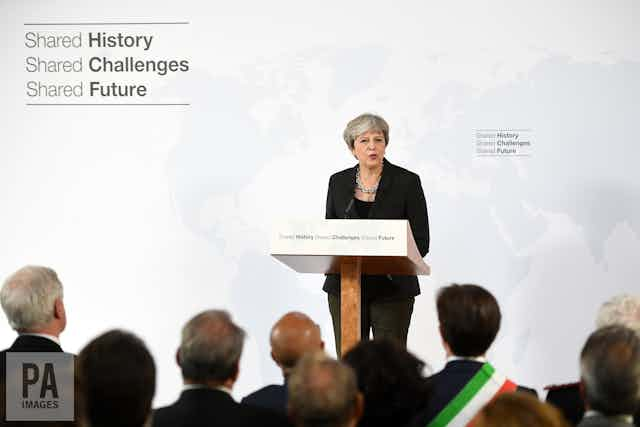In A Room With A View, a English woman’s life is changed profoundly by a trip to Florence. Whether Theresa May had EM Forster’s classic novel in mind when planning her speech on Brexit is moot, but it is clear that a Lucy Honeychurch-style escape from the cares of the world is not currently on the cards for her.
This speech mattered, because it was May’s last opportunity to unblock the Article 50 negotiations before the European Council meets in October to decide whether there has been “sufficient progress” to move to the second phase of Brexit talks – when the two sides will negotiate a transition arrangement for the UK’s departure from the European Union.
The first phase of talks has run into the sand somewhat. The initial topics of financial liabilities, citizens’ rights and the Irish border have proved more difficult to unpick than had been anticipated, not least because the UK has been unwilling (or unable) to settle on a definitive position. This was the opportunity to change that dynamic.
So what went well and what less so?
May needed to provide three elements of substance to make a real difference on negotiations.
The first was movement on the current phase of talks. May did little more than restate a commitment to the principles agreed for citizens’ rights and the Irish border, with nothing of any substance provided to advance debate.
In contrast, the decision to “honour the commitments we have made during the period of our membership” opens up the financial liabilities question for a much-quicker settlement. That is a genuine concession.
Another point of progress was on transition arrangements for the period between leaving the EU and starting the new relationship. In many ways, this was the focus of May’s speech. She agreed that a two-year period will be needed after the Article 50 window has closed in 2019 and before the future partnership between the UK and EU is in place. During that time, she said, most of the UK’s current rights and obligations will be continued. This fits clearly with the thinking in Brussels, where there is minimal interest in trying to resolve the myriad issues that a harder break would entail. Crucially, free movement will continue during this period, though May wants European citizens to register with the UK government.
On the shape of the new, post-transition relationship, May was as vague as she has always been. She again failed to move beyond the platitudes of the desire for a “deep and special” relationship and the need for “creativity” in finding ways of working together. As so often, May failed to explain why the benefits of cooperation would be better secured outside the EU than in.
A gift for Barnier
The initial plan for the speech had been for it to be much more low-key than it ended up. It was Guy Verhofstadt, the European Parliament’s lead on Article 50, who had let the cat out of the bag that May was planning a major intervention that would lead to a delay in the next round of talks.

This ramped up the pressure on Downing Street, which has been exceptionally tight-lipped about what the speech would contain until the very last moment. Unfortunately, such reticence to talk meant that speculation ran wild, especially in the UK, ultimately leading to an article by Boris Johnson, the foreign secretary, the weekend before the speech. This placed a marker on how far May could go on substance, given her uneasy relationship with the Tory party since the general election.
But perhaps the biggest failure on the groundwork has been giving the opportunity to the EU to get its views in first. Michel Barnier gave a speech to the Italian parliament in Rome the day before May’s appearance that set out both the state of play on Article 50 and what the Commission will require from the UK. As at every other point in this negotiation, the EU sets the agenda, rather than the UK.
Wrong crowd
Probably the most effective speech Theresa May ever gave was in October 2002, when she told the Tory party conference that people saw it as “the nasty party”: she judged the moment well and helped instigate the shift in rhetoric and presentation that ultimately took David Cameron into Number 10.
Today’s speech looks painful by comparison.
After months of delay in triggering Article 50, followed almost immediately by the snap general election, and a persistent failure to map out any clear plan of what the UK wants, to present this as the moment for the EU to “share responsibility” for resolving Brexit will deeply rankle.
If this was May coming with the olive branch of showing that the UK is serious about finding an agreement, then many EU officials might feel that she has beaten them about the head with it.
Ultimately, this speech has followed in the tracks of all of May’s predecessors; playing to the domestic audience, rather than the European one. By continuing to present a confused and somewhat belligerent face to her negotiating counterparts, May might find that the only view from her room in Florence is of the dusty road to irrelevance in Brussels and an early leadership challenge in London.

